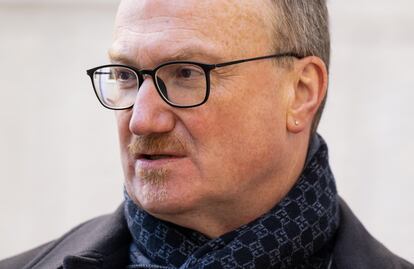German Finance Minister’s advisor: ‘In recent years the Commission has misinterpreted the fiscal rules’
In the face of rising interest rates, Lars Feld warns of need to return to budgetary discipline and accuses France of bending the rules to spend more


While the battle over tax reform rules is raging in Brussels and as its two sides become increasingly clear-cut, there is one man who does not appear in photos and yet has a lot to say about the German position. Economist Lars Feld is the chief advisor to the German Finance Minister, the liberal Christian Lindner. He is also leading the group calling for a return to the austerity of the pre-Covid pandemic and pre-Russia-Ukraine war years against those who believe it is time to leave discipline behind and give spending a somewhat free rein. He was interviewed via Zoom by EL PAÍS, La Repubblica and Ansa on Friday, June 16, in the middle of the Eurogroup meeting. The summit ended with the two sides entrenched in their opposing positions. Lindner argues that the rules should be common and equal for all. In contrast, France wants to increase the scope for investment. Feld, who was president of the German Council of Economic Experts (popularly known as “the five wise men”) and heads the Walter Eucken Institute, is more explicit than the minister in his criticism of the Commission’s proposal and of France in particular, which he accuses of bypassing the Stability Pact from the outset.
Question. How do you assess the French position?
Answer. France has not wanted the Stability Pact for a long time and would prefer to get rid of the fiscal rules. This can be seen very clearly in the French medium-term financial planning for the coming years. There has been a massive increase in defense spending, investments in new nuclear power plants, etc., financed by increased debt. The publication of the letter from the 11 finance ministers shows that Germany is not alone. In several respects, the proposals presented by the Commission are unacceptable from the point of view of these countries. Le Maire [the French Finance Minister] underestimates the danger of having increased debt posed by new turbulence in the financial markets.
Q. They do not trust the Commission to negotiate with individual countries. Why?
A. In recent years we have seen that the Commission has interpreted the rules inappropriately. It has already differentiated widely among the Member States and has used its discretionary room for maneuver. This has not served to build trust. The grace period until higher interest rates eat into budgets through higher interest payments passes quickly. And then problems in the financial markets will again be likely. Incidentally, there is an important difference in the fiscal policies of Italy and France. Italy has a will to consolidate. It has regularly posted primary surpluses, although they may not have been sufficient due to its level of debt and due to the difficulty posed by the country’s weak growth. Meanwhile, in France, the will to consolidate has been absent since the 1980s. That is not acceptable in the monetary union.
Q. Do you see a risk of recession in Germany?
A. There is risk, although I do not like to talk about recession for two quarters of weak negative growth. What is also apparent is that there is no real momentum for the rest of the year. Inflation is a clear drag on the economy. There is lower private consumption, high interest rates are massively weighing down the construction sector and, as a result, they are holding economic development back.
Q. Is there a danger that Germany will once again become the sick man of Europe?
A. I wouldn’t go that far, but it is true that Germany is lagging behind the competition. We lead in many cost categories relevant to companies. We have the highest energy costs in the world, high tax burdens, regulatory, labor, and wage costs due to social security contributions. The latter is only going to get worse because of demographics. But what everyone has in mind now is how highly regulated German industry is. A pharmaceutical company gets approval for animal testing in three months in the U.S., but in Germany it has to wait a year. That is simply a disaster. Then there is the dysfunctional administration: the digitalization of public administration in Germany is right now worse than in Greece.
Q. Speaking of inflation, don’t companies contribute by raising prices to make profits, as Christine Lagarde pointed out?
A. President Lagarde has approached this very cautiously. Rightly so, because the evidence is relatively sparse. In some sectors in the euro zone, price increases are outpacing costs. But if analyzed as a whole, in terms of goods and services, macroeconomically, greed inflation [or “greedflation” (greed + inflation), a term that refers to using inflation as an excuse to generate record profits at the expense of consumers] does not show. The current inflation is the interaction of a very expansionary monetary policy with a very expansionary fiscal policy worldwide. There is no need to try to find scapegoats elsewhere. Monetary policy reacted too late, but is on the right path now, leading to tighter monetary policy. Fiscal policy must also be more restrictive. Most of what we are experiencing now in terms of inflation has to do with the framework conditions that were already in place under the pandemic. Think of the generosity with which the restaurant industry was rewarded in the fall of 2020. In the end, restaurants didn’t even want to open at Christmas because they were getting so much money.
Q. So, was Germany’s massive aid a mistake?
A. It depends. We will see when we know exactly what it was spent on.
Q. The ECB has admitted that interest rate hikes are already having a negative impact on the economy: should it be more cautious now?
A. We have stubborn inflation not only in Germany, but also in other countries; in the Baltic states it is much higher. The ECB should aim to reduce euro area inflation to 2% on a sustainable basis, and, according to its own forecasts, it will probably not achieve this until 2025. This means that it would do well to carry out the next interest rate hike in July, analyze it over the summer, and decide whether another hike is necessary before the end of the year. After all, a tight monetary policy is intended to influence the economy through weaker overall economic demand, especially through the construction sector. We can be satisfied if the tighter monetary policy is maintained without significant effects on the labor market.
Q. Is the German labor market holding up well?
A. We are seeing an increase in the unemployment rate, which is mainly due to the number of refugees from Ukraine. But for the time being it seems that the German labor market will remain robust.
Q. Lindner delayed his budget statement because of rifts within the coalition. How serious are they?
A. Difficulties in the budget process have happened before; it is not the first time. After such a long period without significant restrictions on spending growth, it is also not surprising that a government has to practice a new fiscal realism. In any case, Chancellor Scholz’s participation in the discussions with the departments demonstrates that the Chancellor’s Office supports the Ministry of Finance. Some of the wishes expressed by the ministries simply cannot come true.
Q. Will the debt brake be observed?
A. Of course. This finance minister has some red lines that he must not cross. And one of them is compliance with the debt brake. This coalition will govern until the end of the legislature, maybe even beyond. At present, no one except the [far-right] AfD is interested in new elections. The federal government will agree to comply with the debt brake and implement priority measures.
Q. Do you see the danger of deindustrialization condemned by the opposition?
A. The role of the opposition is to show off by exaggerating somewhat. For now, we do not see a massive exodus of companies. But we can already see, and this is certainly a warning sign, that many investments of both large and small and medium-sized companies are taking place abroad. I would not speak of deindustrialization, but we certainly have a cost problem.
Q. The Federal Minister of Economic Affairs and Climate Action, Robert Habeck (of the Green Party), has proposed a special electricity tariff for industry.
A. I am very critical of that, because it sets totally wrong incentives. Electricity will not be cheaper in Germany. Prices will continue to rise, and with the price of CO2 they will have to. Therefore, it is better to alleviate other costs for companies, such as the tax burden or regulatory costs, which are what bothers them most at the moment.
Q. Will Germany survive without nuclear power?
A. Germany will not manage without nuclear power, but will get it from abroad, especially from France. I don’t understand why nuclear power should be shut down in a situation like this. It is not a question of fundamentally questioning the anti-nuclear commitment of previous decades, but only of using a bridging technology during the years until electricity can be produced almost entirely from renewable energies.
Q. Will the Spanish Generel Election, in the middle of the country’s presidency of the EU, affect the projects underway in Brussels?
A. I do not believe that the EU will be paralyzed by the Spanish elections. The Commission will continue to push hard, especially in climate policy [the European Green Deal]. However, with such a controversial situation as we see with the fiscal rules, it will be more difficult to reach an agreement in the second half of the year due to the elections in Spain. If so, reform before the European Parliament elections will hardly be feasible.
Sign up for our weekly newsletter to get more English-language news coverage from EL PAÍS USA Edition
Tu suscripción se está usando en otro dispositivo
¿Quieres añadir otro usuario a tu suscripción?
Si continúas leyendo en este dispositivo, no se podrá leer en el otro.
FlechaTu suscripción se está usando en otro dispositivo y solo puedes acceder a EL PAÍS desde un dispositivo a la vez.
Si quieres compartir tu cuenta, cambia tu suscripción a la modalidad Premium, así podrás añadir otro usuario. Cada uno accederá con su propia cuenta de email, lo que os permitirá personalizar vuestra experiencia en EL PAÍS.
¿Tienes una suscripción de empresa? Accede aquí para contratar más cuentas.
En el caso de no saber quién está usando tu cuenta, te recomendamos cambiar tu contraseña aquí.
Si decides continuar compartiendo tu cuenta, este mensaje se mostrará en tu dispositivo y en el de la otra persona que está usando tu cuenta de forma indefinida, afectando a tu experiencia de lectura. Puedes consultar aquí los términos y condiciones de la suscripción digital.








































